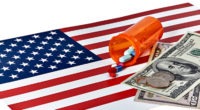New Ways for Supply Risk Mitigation Post COVID-19
An upcoming DCAT webinar this coming Tuesday Jan. 26, will provide thought leadership on what pharma companies, CDMOs/CMOs and other suppliers need to consider to further mitigate supply risk post COVID-19.
The COVID-19 pandemic has placed new pressures on pharma manufacturing networks (internal and external) and supply lines. When the pandemic first emerged and since, travel restrictions, government-directed closures of business to support public health measures, and other issues have made supply chains, including those of the pharmaceutical/biopharmaceutical industry, more vulnerable to supply-chain disruptions. Although the industry has navigated through these issues as it responded to the pandemic, going forward, the COVID-19 pandemic has obliged a re-evaluation of manufacturing networks and supply lines.
 |
|
Andrew D. Skibo |
To facilitate companies in making these all-important evaluations, the Drug, Chemical & Associated Technologies Association (DCAT) will be holding on Tuesday January 26 (11:00 AM to 12:30 PM ET), DCAT Sharp Sourcing, a thought leadership forum. The 90-minute webinar, Pharma’s Manufacturing and Supply Lines: New Ways for Risk Mitigation Post COVID-19, brings together a panel of industry experts to provide thought leadership on what pharma companies, CDMOs/CMOs, and suppliers need to consider and the options available to them to further strengthen sourcing and supply practices to mitigate risk and assure supply of raw materials, intermediates, active pharmaceutical ingredients (APIs), and other materials used in drug manufacturing. Further information on the webinar, including how to register, may be found here.
 |
|
Laurie J. Chipperfield |
To provide perspective on these issues, Andrew D. Skibo, former Head of Global Biologics Operations for AstraZeneca, and now Chief Manufacturing Officer, FluGen, a vaccine-development company, will provide his views on what pharmaceutical/biopharmaceutical companies and their suppliers can consider in re-assessing their manufacturing networks and supply lines for further risk mitigation. With more than 40 years of experience in the industry and first-hand knowledge, he will provide valuable and practical insight on whether a new normal is in the making for manufacturing and supply networks, and if so, what that may be.
In looking at the global biopharmaceutical/pharmaceutical manufacturing value chain, China plays an important role in the supply of raw materials, intermediates, and APIs. With the COVID-19 pandemic placing additional pressures, including travel/flight reductions, on the movement of goods and materials, companies have had to evaluate their sourcing practices from China and conaider possible adjustments. Laurie J. Chipperfield, Senior Director, Global External Supply, Pfizer Worldwide Research & Development, will examine the practical considerations and implications when sourcing from China.
 |
|
Chad P. Bown, PhD |
One of the impacts of the COVID-19 pandemic has been a move by governments, including the US, the European Union (EU), and others to either require or incentivize the onshoring of some drug manufacturing domestically. These proposals/actions have largely been focused on medicines deemed “essential” and apply to certain generic drugs and are seen as a way to mitigate vulnerabilities in the drug supply chain that have been exposed during the COVID-19 pandemic. The extent to which these proposals/actions move forward in the US with a new President/Administration and Congress taking office this month (January 2021) has yet to be determined and will be a key issue in 2021. In the EU, a reduction of reliance on offshore drug manufacturing is on the policy table as part of the European Commission’s Pharmaceutical Strategy for Europe, which the European Commission adopted in November (November 2020). It includes a plan for initiating a structured dialogue with and between stakeholders in pharmaceutical manufacturing and public authorities to identify vulnerabilities in the supply chain of critical medicines and to shape policy options to strengthen the continuity and security of supply of medicines in the EU. How that dialogue will unfold and the actions/policy arising from it will also be an important issue for the industry in 2021.
To provide a perspective on these issues, Chad P. Bown, PhD Senior Fellow, the Peterson Institute for International Economics (PIIE), a well-renowned policy research institute, will provide a perspective on the feasibility of such policies in the US and EU moving forward, including the trade implications and financial impact. Prior to joining PIIE in 2018, Dr. Bown previously served as Senior Economist for International Trade and Investment in the White House on the Council of Economic Advisers, and most recently, as a lead economist at the World Bank.
Further information on the DCAT Sharp Sourcing webinar, Pharma’s Manufacturing and Supply Lines: New Ways for Risk Mitigation Post COVID-19, including how to register, may be found here. The webinar will be held Tuesday January 26 from 11:00 AM to 12:00 PM ET.



